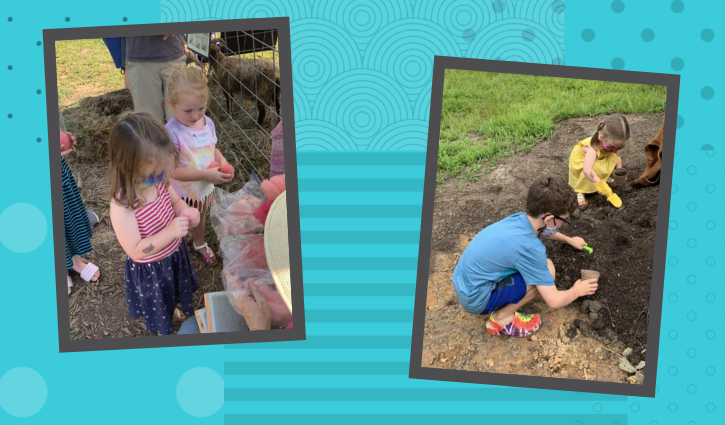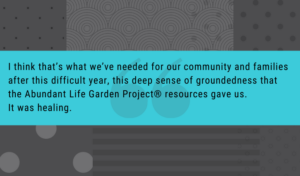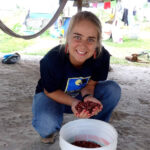How One Church Made the most of the Abundant Life Garden Project® Resources

Calvary Episcopal Church in Fletcher, NC led an Abundant Life Garden Project® – themed Vacation Bible School August 2-6, 2021. This special VBS program integrated the church’s community garden and food pantry into the Abundant Life Garden Project® curriculum. Nanette Woodworth, Associate Rector at Calvary, speaks with Eleanor Withers, the Episcopal Church Programs Associate at Episcopal Relief & Development, about how supplementing the curriculum with hands-on activities in the garden made an impact on the children at her church.
Eleanor: What a wonderful idea to supplement the Abundant Life Garden Project® curriculum with your church’s community garden and food pantry. Tell me a little about what made this VBS unique from other years.
Nanette: One thing that was consistent every day is that we spent at least an hour in the garden. This allowed the students to experience the themes: water, soil, seeds and animals, first-hand. We invited master gardener, Pastor Doug Kearney, who was the garden manager for the garden and food pantry. He is also a retired Lutheran minister and loves gardening. So, to have this fatherly figure slowly and patiently teaching the children was wonderful. Everyone had a job from planting seeds, to watering the plants, to harvesting, to clearing rocks. I have never seen a group of children so engaged. Especially during the garden time, it was hard to get them to come back in for our simple summer family dinner!
Eleanor: How did you connect the food pantry to the curriculum?
Nanette: We talked to the campers about how Jesus said to his disciples, and to us all, that he came so that we might have “life abundant,” or “fullness of joy.” We talked about how this means that Jesus loves each of us, cares deeply for us, knows our hopes and dreams for our lives and wants us to trust in him that he will guide us as we grow and live into our deepest wishes for our lives. We also spoke about how living into fullness of joy also means that we will be able to give to others out of that fullness who have difficult circumstances. We focused on how to care for others the way Jesus cares for us. And of course, we explained how one way to do that is to take care of Lord’s Acre garden at Calvary, and in so doing, help nourish those who come to the food pantry. Every Saturday we feed around 100-300 people at the church through the garden and food pantry. It was special to have the children “give out of their fullness” by working in the garden and participating in this ministry.
Eleanor: How did you incorporate Episcopal Relief & Development in the curriculum?
Nanette: Every day we showed a different video about Episcopal Relief & Development from the Stories from the Field booklet. The ”do” activities we used also connected to those videos and Episcopal Relief & Development programs, like the clean water program. The very first day we had the children carry water from the playground to the garden in order to show them how many families around the world transport water several times a day. We asked them, “what would it be like to do this every day, just to have water?” Then we showed them how we have gradually created a more efficient way to water the community garden. First, we just had a hose, then we switched to a sprayer and now we have a sprinkler system. That’s how change happens, little by little. The children also chose to contribute to Gifts for Life by bringing in change collected in the water bottle banks they created the first day and we sent that in to purchase a goat for a family. The remainder of the donations went to support earthquake relief efforts in Haiti.
Eleanor: What day did the children enjoy the most?
Nanette: On the animal day, we had a local farmer bring her sheep to meet the children. The children fed the sheep, petted the sheep and she demonstrated how she uses the wool to knit all sorts of different clothes. This was also the day that we read the story of the good shepherd so it fit in perfectly.
I really do believe that through the prayers, songs and stories the children made a connection to their part in God’s creation tending and nourishing living plants and animals. It was one of the calmer and more spiritual VBS programs that we have ever had. I think that’s what we’ve needed for our community and families after this difficult year, this deep sense of groundedness that the Abundant Life Garden Project® resources gave us. It was healing.
 Eleanor: You are making me tear up! I am so happy to hear that. Did you find any of the resources especially helpful?
Eleanor: You are making me tear up! I am so happy to hear that. Did you find any of the resources especially helpful?
Nanette: Every day we sent home a bag of stuff for the families including the Home and Hearth Engagement Sheets. Several parents said that when they were back home with their children and putting them to bed, the children were just so excited to talk about what they did that day. Those resources to use at home were great.
The science facts also really helped me. My expertise is more in the Christian formation so it was helpful to have those facts to talk about and they were really fascinating. For example, the Earth is made up mostly of water but we only use 1% of that water and so many people don’t have access to clean drinking water. Those facts helped put things in perspective. The curriculum also focused on the meaning behind the stories in the Bible which was helpful. When you are in school in a secular environment people don’t necessarily read the Bible as narrative and history as they should. History plus narrative, science and religion – those are important themes to start talking to kids about early. This program does that which is another strength.
Eleanor: Any tips for others that might be interested in using this curriculum?
Nanette: When I put together a program like this, I always tell folks that it is a collaborative effort. I don’t enjoy a situation where I’m telling everybody what to do. My kind of leadership is honoring the gifts that the people (adult volunteers and storytellers) bring and something happens there that is so special. There are always surprises there that you didn’t write into the script but that really make the program come to life. It’s all about respecting what the people bring, not just physical things like props and instruments but the experiences that they have. The ways that they have improved the script with something that I didn’t think of or what have you. That’s what’s special. And sometimes it takes training. I think it’s deep in our Judeo-Christian psyche to want to be told where to go and what to do and follow directions. But we all know that having God in our life is not being a puppet on a string. We are called to be co-creators with God. We have to model that in the way that we lead.
Eleanor: That sounds like Asset-Based Community Development (ABCD)! ABCD is the foundation for all of our international programmatic work as well. Amazing how that philosophy relates to so many different types of life scenarios–utilizing people’s gifts in order to create something wonderful. That is a great way to end the conversation. Thank you so much, Nanette, for this heartfelt interview and for your important ministry with children, the Lord’s Acre, the food pantry and Episcopal Relief & Development.
 |
Eleanor Withers is the Episcopal Church Programs Associate at Episcopal Relief & Development. |


